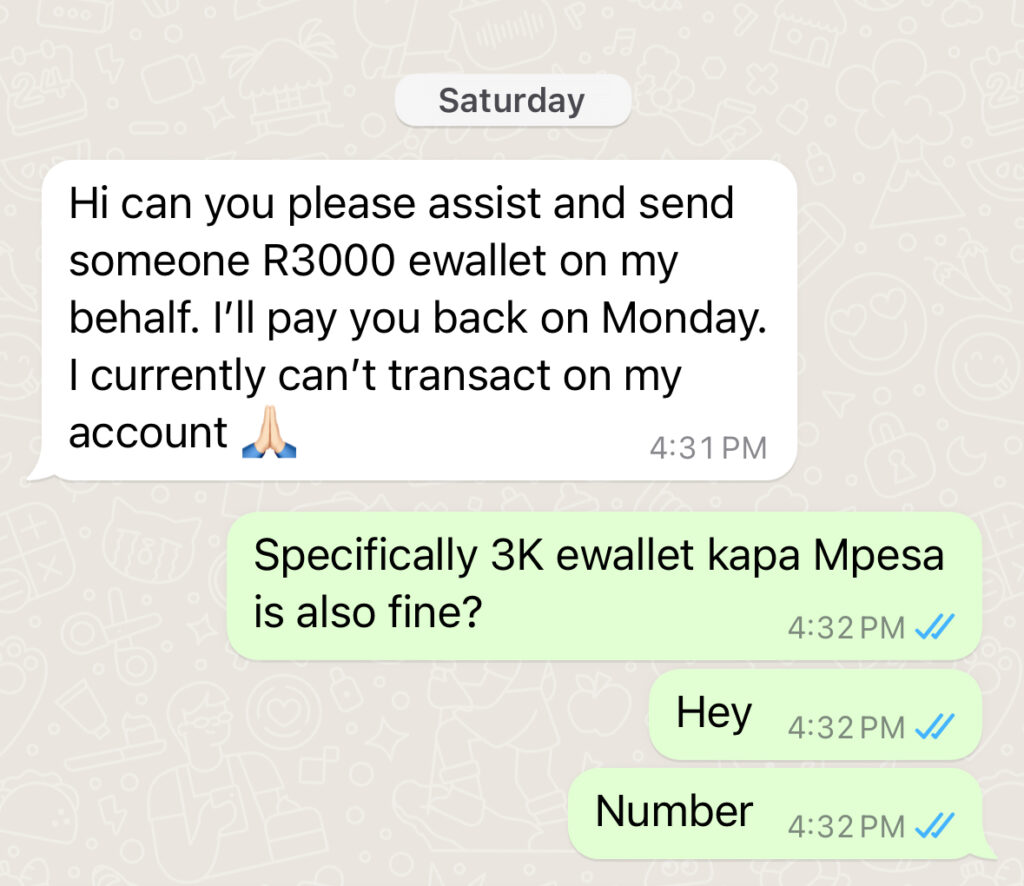By Tokiso TKay Nthebe
I have a money confession, I got scammed and I am embarrassed!
In which world does The Finance Bachelor get scammed?
As someone who writes and speaks widely on personal finance matters and with a few articles published about online scams, digital fraud and digital financial literacy, I am bitterly embarrassed to admit that the scammers got to me too. My hope with sharing the experience in this blog is that you can learn from my mistake and avoid repeating it.
What happened?
It was a very cold and gloomy Saturday in Maseru, Lesotho when I received a strange WhatsApp text message from a friend telling me she cannot transact and humbly asks that I assist her to send R3000 Ewallet to someone. At first, I found the text message odd because we usually do not have these kind of engagements and or requests with this individual often.

My second thought was to call and verify, but I was busy and distracted at the Basotho Flea Market. As I went about my business, I thought perhaps she really needed help, remembering a previous message from September 2023 when she could not transact and asked that I assist. So, like a complete idiot who should have called to verify I went ahead to process the transaction. This is where things got messy!

On Monday, 1 July 2024 I received another message from her telling me that her account has been hacked and we should not send money or respond to the requests made on her behalf. At this point, I knew that I had been scammed. The Finance Bachelor was SCAMMED!!!
What did I do wrong?
Sadly, if this can happen to me, it can happen to anyone which is why I am intentional about sharing my mistakes so candidly and openly. Scammers prey and take advantage of our vulnerability, emotions and distractions.
# Unfounded rationalisation
Something told me that this request was suspicious and needed to be investigated before sending her money. It is unlike her to make such requests or ask for money from me, especially after pay day. I rationalised my decision based on our previous transaction which unfortunately was flawed. I should have listened to my intuition and did the enhanced due diligence by calling to verify or ignoring the WhatsApp text.
# Being emotional and people pleasing
Despite knowing that this person ordinarily would not borrow money from me, I convinced myself that she genuinely cannot transact and needed my help. I allowed my urge to help, and assist get the better of me because I love helping and fixing situations. Her account being hacked was the farthest from my mind and I saw no reason why I should not help. I knew that if she indeed needed my help, she would pay the money on Monday like she promised because I trust her. Add being distracted to the mix and the scammers happily lure and trap you!

How to avoid being scammed?
Unfortunately, digital fraud and scams are on the rise where people are losing their hard-earned money. We need to exercise caution and be vigilant to avoid being victims. In the article ‘Three tips to protect your money and secure you future’ I discussed tips to help you avoid being scammed which I summarise below.
# Do not share your personal information
Protect your personal information, especially when transacting online. Do not give anyone your personal information including ID or passport number, date of birth or cell phone number because this can lead to identity theft where someone fraudulently uses your details to access credit pretending to be you.

# Do not open unfamiliar links
Have you received an SMS, WhatsApp message or email requesting you to click a link to redeem a prize or confirm your details? Think before you click and ask yourself, ‘is this a legitimate link?’ Do not open links that you do not recognise because they may be fake websites, leading fraudsters to access your confidential information.
# Do not share your login details
Your financial services provider will never ask for your login details i.e. username or one-time password. Should anyone call you asking for these details, do not share them and drop the call immediately. Similarly, keep your bank card safe and never give anyone your personal information number (PIN), card number and CVV number.
# Social media scams
Scammers are using social media platforms like WhatsApp, Facebook, TikTok and Instagram to scam us. Do not click on links or act on requests asking you to share your information. It is important to improve your digital financial literacy skills and be vigilant when transacting online. Protect your money and do not fall victim to digital fraud schemes or risk cybersecurity attacks.
As a finance professional, nothing compares to the judgement and embarrassment I am experiencing as I write this blog post. I should know better but beating myself up about what I should or should not have done will not bring back my money. I do hope that this experience helps you to avoid making a similar mistake. Let’s be responsible and vigilant, we work too hard for our money to lose it to scammers.

Thank you for this awareness, we should indeed listen to our intuition and use our heads not our emotions.
I am so glad you found it valuable. We really do need to exercise caution and use our heads before taking action. It’s in moments when we are most distracted that we make mistakes.Your comment and feedback is highly appreciated.
There has been so many attempts made on me that every time i get calls and texts about money exchanging, im usually doubtful. Sorry though. Verification is always best , ☺️
I am always so vigilante and skeptical, for some reason I went ahead and did it this time. Let’s call it lesson learnt. A very costly lesson at that. Thank you.
Rea leboha for sharing the information, so sorry about that Tk
It is through sharing our experiences that we can hopefully learn and avoid repeating them. Thank you for the feedback, I am glad you found it insightful.